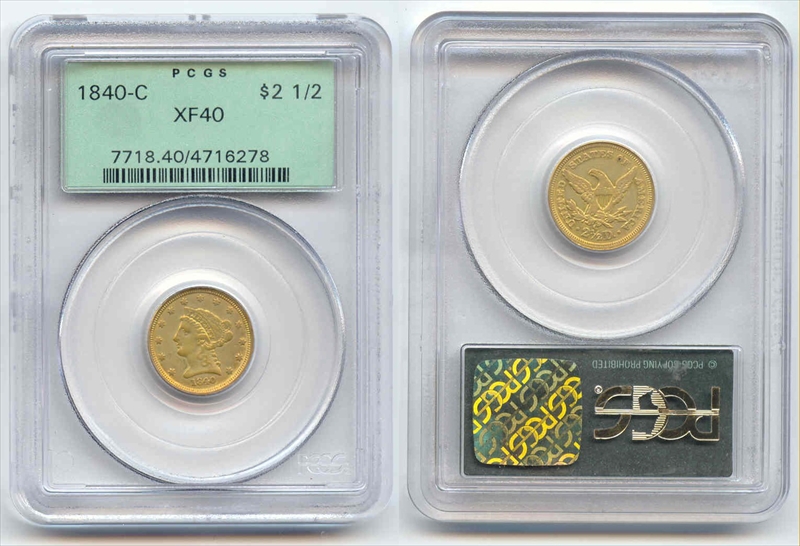1840-C $2.50 XF40 认证号04716278, PCGS号7718
专家评论
David Akers (1975/88)
Surprisingly, the 1840-C generally comes more sharply struck than the 1840, and despite its lower mintage, is also easier to obtain in all grades. Nevertheless, it is very scarce, particularly in higher grades, and like most quarter eagles of this period, it is usually only available in EF or less. The mintmark is very small and this small sized C is also used on the 1841-C, 1842-C and 1843-C Small Date.Doug Winter
In 1840, the quarter eagle was redesigned. Christian Gobrecht’s Coronet type obverse (better known to collectors as the “Liberty Head”) was adopted. It remained in use until it was retired in 1907. In addition to the adaptation of the new design on the obverse and reverse, the mintmark was moved to the reverse and placed between the olive branch and the denomination.The 1840-C quarter eagle is usually seen in VF and EF grades. It is more available in higher grades than generally acknowledged. A number of the higher grade pieces were not known to collectors as recently as ten to fifteen years ago. This date remains rare in the higher AU grades and it is very rare in Mint State.
The 1840-C is a popular issue with collectors due to its status as the first Liberty Head issue from this mint.
STRIKE: This date is much better struck than the other Charlotte quarter eagles from the early 1840s. In fact, it is among the best struck quarter eagles from this mint. It is possible to find an example with virtually complete detail at the centers and the borders. The obverse is usually very sharp and even and the curls around the face show full definition. The stars are bold with most having full radial lines. The reverse is equally as sharp with strong detail visible on the feathers, legs, claws and the neck. On both sides the denticles are very sharp and partial wire rims are often visible.
SURFACES: Some 1840-C quarter eagles were struck on poorly prepared planchets. It is not uncommon to find examples with mint-made roughness. This is most often visible in the form of granularity in the obverse fields and, less often, on the reverse. Pieces are known which show a “ring” of mint-made roughness at the inside of the stars. Some exist with relatively clean surfaces and these are very desirable.
LUSTER: The typical example has pleasing frosty luster. The quality of this luster tends to be better than that seen on the 1841-C or 1842-C quarter eagles. A few are known which are semi-prooflike with a good deal of reflectiveness in the fields. These are rare but most collectors prefer 1840-C quarter eagles with a frosty texture.
COLORATION: Original uncleaned 1840-C quarter eagles are seen with hues which range from light to deep yellow-gold. Some are also seen with a green-gold hue as well. The coloration on higher grade, original examples is among the most attractive found on any Charlotte quarter eagle from the 1840s. Until recently, a decent number of examples were known with original color but these have become very hard to find.
EYE APPEAL: There are a number of high quality, very attractive, 1840-C quarter eagles known. These show very sharp strikes, excellent luster and pleasing coloration. As one might expect, these coins are rare and are in demand among Charlotte collectors.
DIE CHARACTERISTICS: A number of small raised die lines can be seen near the final two stars. Other raised die lines are seen through the letters on the headband. All 1840-C quarter eagles show unusual circular raised die lathe lines on the portrait of Liberty and on the neck. These were first mentioned in print by the cataloger of the Bass II: 326 coin in 1999.
DIE VARIETIES: A single die variety is known.
Variety 1 (formerly Variety 1-A): The 1 in the date is slightly repunched with the first punch too high. The 1 and the 0 are equidistant between the bust and the denticles. The reverse was used only in 1840. The mintmark is small and its serif is joined to the feathers. It is a bit closer to the talon than to the fraction bar and is also closer to the 1 than to either the talon or the fraction bar.
PCGS #
7718
设计师
Christian Gobrecht
边缘
Reeded
直径
18.00 毫米
重量
4.18 克
铸币数量
12822
金属成分
90% Gold, 10% Copper
更高评级数量
117
评级较低的钱币数量
26
地区
The United States of America
价格指南
PCGS 数量报告
拍卖 - PCGS 评级的
拍卖 - NGC 评级的
稀有性和存量估计 了解更多
| 所有评级 | 150 |
| 60或以上 | 8 |
| 65或以上 | 0 |
| 所有评级 | R-7.5 |
| 60或以上 | R-9.6 |
| 65或以上 | R-10.1 |
| 所有评级 | 58 / 147 TIE |
| 60或以上 | 43 / 147 TIE |
| 65或以上 | 1 / 147 |
| 所有评级 | 58 / 147 TIE |
| 60或以上 | 43 / 147 TIE |
| 65或以上 | 1 / 147 |
状况普查 了解更多
| #1 MS63 PCGS grade |
| #1 MS63 PCGS grade |
| #1 MS63 PCGS grade |
| #1 MS63 PCGS grade |
| #1 MS63 PCGS grade |




















